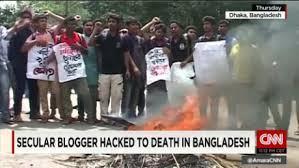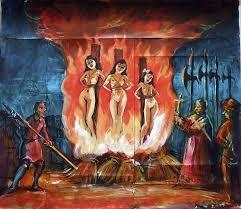Religion can inspire good deeds. Or killing people with machetes.

The West has its own history, of course, of religious intolerance, persecution, and violence. The Inquisition tortured people for God.

But in the West, religion finally calmed down, became domesticated, and nobody here any longer imagines burning people alive for God. My local humanist society meets openly, unmolested, even advertising its nonreligious orientation.
That would not be possible in most Muslim countries today. This actually represents retrogression, because in past epochs Muslims were much more tolerant of religious heterodoxy; but they’ve gone in the opposite direction from the Christian West. There’s no church/state separation. In many Muslim nations, “apostasy” carries a death sentence. (In Pakistan “blasphemy” does. Pakistan has not actually executed anyone for blasphemy, but over 60 people accused of it have been murdered.)
If you read the Koran (here’s my review), its number one theme is nonbelievers will be punished. Repeated on almost every page. But some Muslims today can’t wait for God to do the punishing. They think they’re doing his work for him. A small minority of Muslims, actually; but it doesn’t take many to perpetrate an awful lot of violence.

Some show bravery in battle, for their country or comrades; some in defending their families. But the courage we’re talking about here — for an idea — is of a very special sort. I’m in awe of these noble heroes.
And I’m proud to support them, with money at least, by funding Secular Rescue, a program run by the Center for Inquiry (a leading organization promoting secular humanist values). The program assists, defends, and protects writers under threat for expressing viewpoints that challenge local religious orthodoxies, mainly in Muslim countries.

I will match contributions to Secular Rescue by any of my blog readers (click here).
This is not just a matter of freedom of expression — increasingly important though that is in today’s world. Open debate is crucial for moving any society forward. But it’s especially urgent for the nations in question because they do harbor the kinds of pernicious beliefs that bring forth the sort of violence described. These Muslim societies are in need of an Enlightenment, like the one in the West that ultimately tamed religious persecution, and opened the path for human progress in so many other manifold ways. That sort of progress requires people with the vision and courage to challenge reigning orthodoxies. That sort of progress cannot happen if such people are silenced, intimidated by violence, squelching free debate. Not only the lives of these brave individuals, but these societies’ futures, are at stake. That is the importance of Secular Rescue.
One nonbeliever in a Muslim country was not killed but was actually diagnosed as insane by its medical establishment, forcibly hospitalized and “treated” for his “affliction.”

Atheism is the sane, rational understanding of a cosmos whose observable reality is wholly at odds with religious ideas. Those ideas would be called insane, delusional, if held only by a few; but when held by the many, they are normal. But that nonbeliever may have been the only truly sane person in that Muslim nut house.
Advertisements